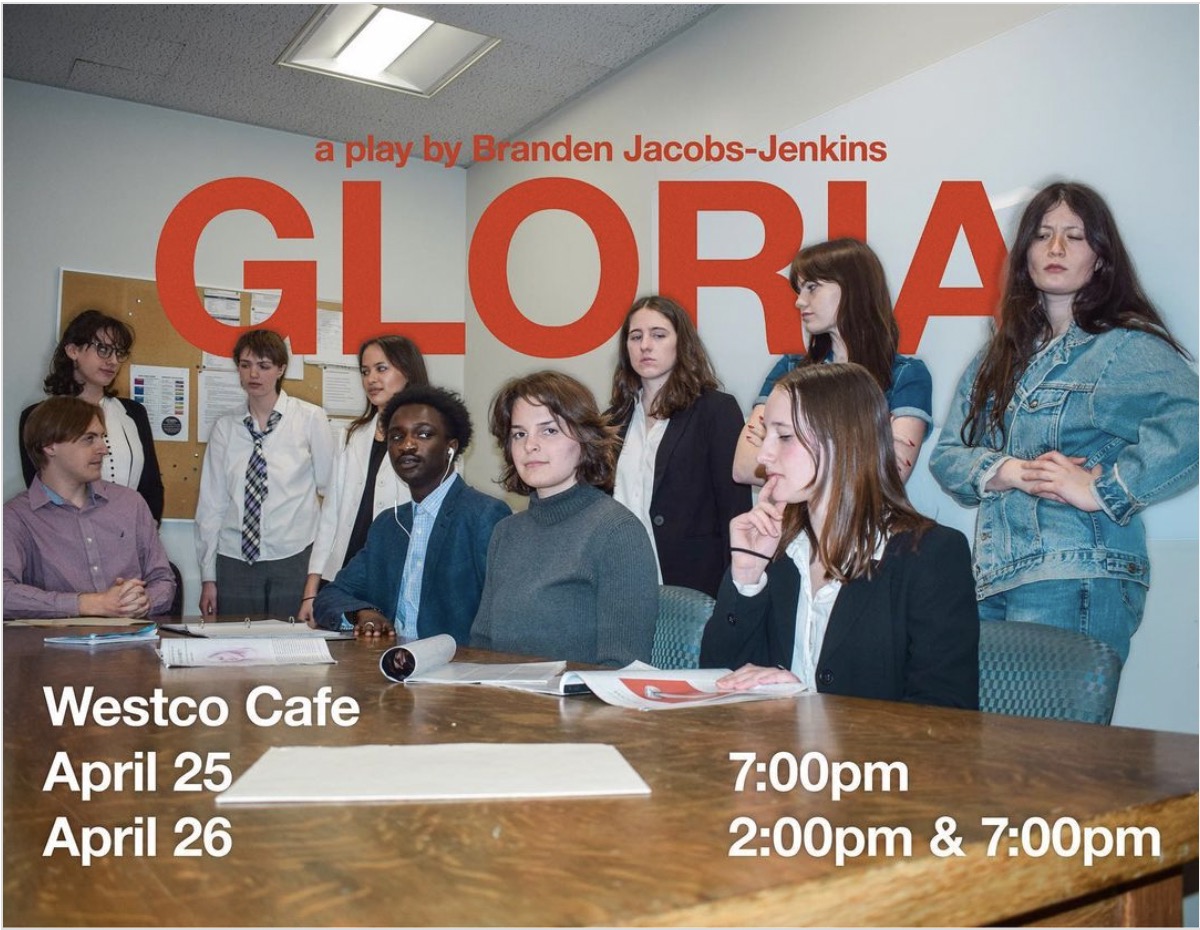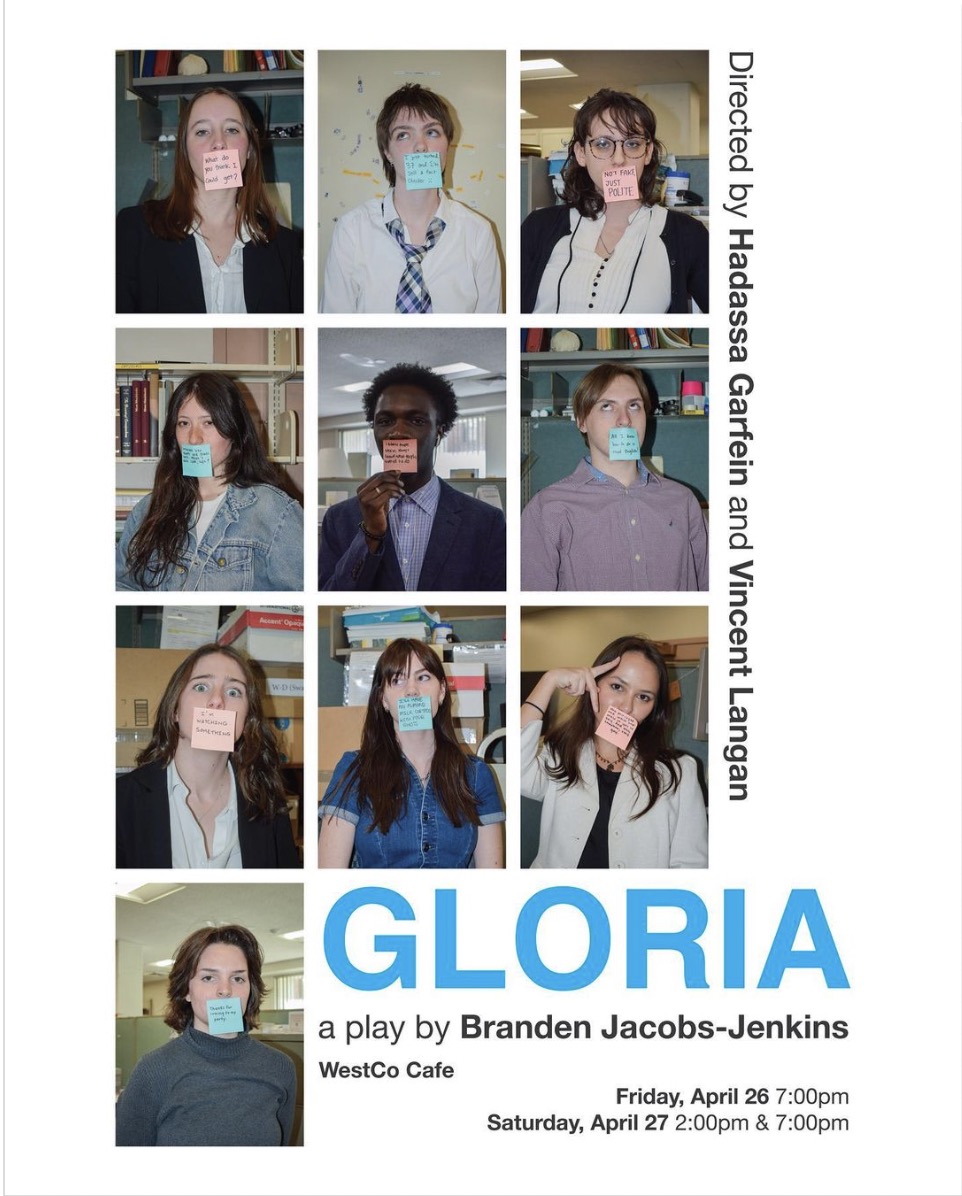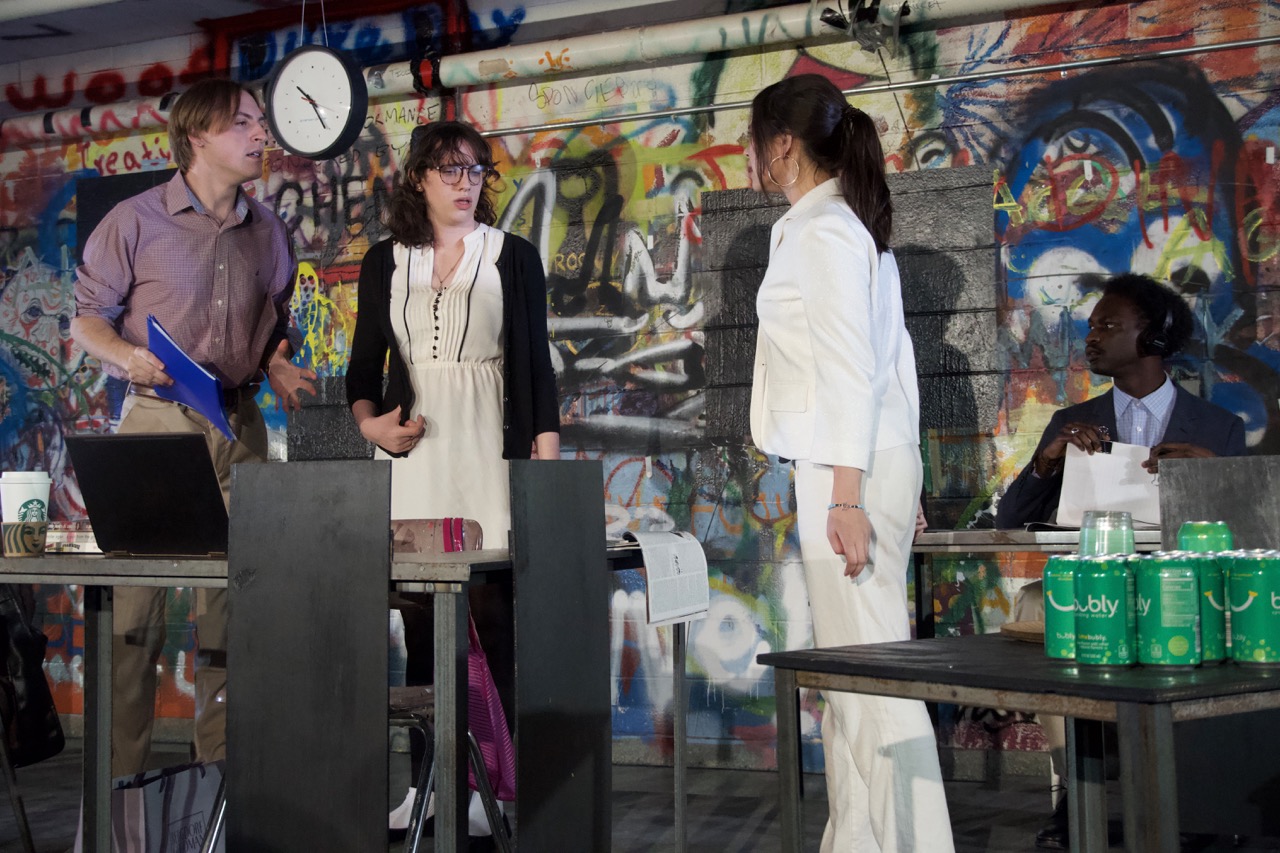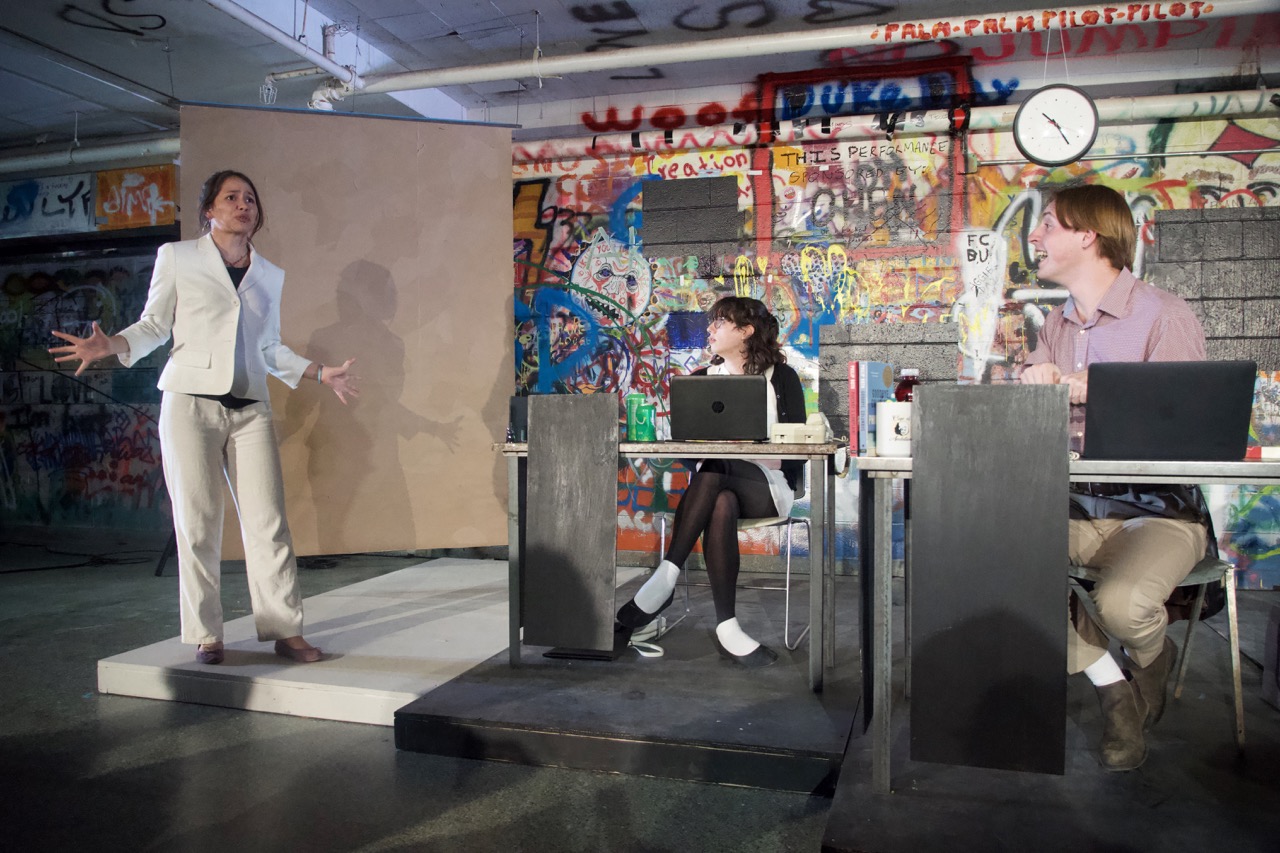
Content warning: this article describes depictions of gun violence and suicide.
“Gloria”—written by Branden Jacobs-Jenkins, directed by Vincent Langan ’24 and Hadassa Garfein ’24 with assistant director Lexi Radziner ’25, and produced by Spike Tape—went up in WestCo Café on Friday, April 26 at 7 p.m. and Saturday, April 27 at 2 p.m. and 7 p.m. “Gloria” follows a group of assistant editors working at a Manhattan magazine as they experience a horrific tragedy and cope with the aftermath. Through its balance of humor, shock, and tragedy, the play allows the audience to think critically about how we treat others and whose stories we get to claim for ourselves.

Walking into WestCo Café, I felt immersed in the world of “Gloria.” Four black desks sat on an elevated platform, each filled with an array of objects: A neat stack of books and an old phone sat on one, while another was littered with empty seltzer cans. After some pre-show announcements, the lights dimmed and the show began as “9 to 5” by Dolly Parton played over the speakers. At the beginning of the first act, the audience was introduced to four characters: Miles (Kofi Agyei-Yeboah ’25), Ani (Miranda Simon ’24), Dean (Miles Allen ’24), and Kendra (Sita Zoey McGuire ’24). They each came into the office, settled down at their desks, and started gossiping about a housewarming party thrown by Gloria (Charlotte George ’24) the night before.
The dynamic between these four characters was vibrant, from the assistant editors ordering intern Miles around and asking him to grab snacks from the vending machine to Kendra and Ani dancing to the fictitious singer Sarah Tweed’s music. I absolutely loved the energy and fun chaos of the first act! Multiple times, the bickering between Dean and Kendra would escalate so much that Lorin (Georgia Reed-Stamm ’25) from the fact-checking department across the hall would come over and awkwardly ask them to be quiet, adding yet another funny moment. While this part of the show left the audience chuckling and even cackling throughout, the humor was offset by some of the content the characters were discussing.
“[T]here’s a lot of interpersonal violence in this play, sort of casual homophobia [and] racism,” Langan said. “And that is a very American way of life, just how flippant and ingrained in us these violent things are.”
Much of this language is directed at Gloria, the office outcast, shedding light on the toxic culture of many workplace environments. Throughout Act I, Gloria would come in to check on the assistants and at times, would hover over Dean or Ani. George’s wide-eyed expression showed us that, although Gloria was standing in the office, her mind was very clearly in a different place. Then she would suddenly storm off, leaving everyone in the room confused and a bit unsettled.

“I found myself, before each rehearsal, rethinking the intentions of each line because I don’t have a lot of lines, but each line has a lot of intention, a lot of information in it,” George said. “What she says is not what she’s thinking in each moment.”
At the end of Act I, Gloria comes onto stage, gun in hand, and shoots and kills both Miles and Ani before taking her own life. This moment, while graphic and vivid, was portrayed elegantly and quietly. There were no gunshots heard, but rather the sound of “Criminal” by Fiona Apple that grew louder as the scene progressed. When asked about this choice, Langan and Garfein both spoke about how they wanted to distinguish between reality and truth.
“I came up with the idea that we should use the motif of the song that we had been playing throughout the show and lean into the choreography of [the] moment instead of the hyper-reality of it, and making it almost as though it was like a dream or a dance of some sorts,” Garfein said. “And we wanted [the audience] to know that this is a scene in a play and not a reality, but also at the same time, something that holds truth and weight to it.”
Langan echoed Garfein’s words, discussing the technical elements that added to the dream-like qualities of the scene.
“Our leading philosophy throughout this whole process was to surprise audiences, not shock them,” Langan said. “People come to the theater to be moved and to experience something. I don’t think they come there to fear for their safety or for the actors’ safety. So we wanted it to have intentionally obfuscated lighting and sound cues throughout the shooting scene.”
The production team was also cognizant of the campus context in which the play went up. On Wednesday, April 24, two days before “Gloria” opened, a drive-by shooting took place near Cross and Pearl Street, and the directors acknowledged this in their opening announcements.
When asked about what it was like to play Gloria in this violent scene, George spoke about the fine line between being horrified by what Gloria does and feeling sympathy toward her.
“[It] shows that all of these compiled components and [workplace] conditions can result in this sort of explosion,” George said.

Act II takes place eight months after the incident and moves at a vastly different pace from Act I. It consists of two main conversations: one between Dean and Kendra and another between Nan (Caroline Seymour ’24) and Sasha (Alex Short ’24). It’s revealed that Dean and Kendra are both writing memoirs about what happened. However, Kendra wasn’t in the office when the incident took place; she was at Starbucks. This frustrates Dean, who witnessed the whole scene unfold and is still reeling from the trauma. Their conversation escalates to the point where Dean slaps Kendra and storms out. This tense scene is juxtaposed with an absurd conversation between Nan and Sasha, at the end of which Nan also decides to write a book about the shooting. It revolves around the time she spent hiding under her desk, during which she realized she was pregnant.
Act III takes us across the country to Los Angeles where we meet Lorin again and follow him through his first day at his new job at a production company. We learn that Nan’s book is going to be turned into a limited series, bringing up questions surrounding how people can profit off of tragedies and whose stories we choose to tell.
“[In “Gloria,”] there’s a lot of…people only caring about themselves and where they are in their lives, and then having no regards for anyone else,” George said. “I think Branden Jacob-Jenkins does a really good job of satirizing how selfish and narcissistic people can be, especially when you’re in [the] media and you’re trying to profit off of trauma.”
Lorin brought a grounding presence to the stage amid the rest of the characters buzzing around the office. He tells his new colleagues, Callie (Eliza Marovitz ’25), Jenna (also played by Short) and Rhonda (Caroline Lamoureux ’24), that he knew Gloria and was there during the incident. Hearing this, they bombard Lorin with questions, interrogating him about Gloria. The only person that Lorin starts to connect with is Devin (also played by George), the loner IT guy.
The final moment of Act III really resonated with me: Sitting alone at his desk, Lorin puts on his headphones and breaks down in tears as music swells in the background. This powerful image gave the audience space to think about who gets left behind in the process of people claiming stories and experiences for their own benefit.
I really loved Langan and Garfein’s choices to double-cast characters. In the original show, Gloria and Nan are double-cast, as are Dean and Devin. However, in this version, Gloria and Devin were both played by George. This makes Devin’s line to Lorin toward the end of Act III all the more chilling.
“You know I’m not gonna shoot up the office, right?” Devin asks.
Langan and Garfein were originally going to put up “POTUS” by Selina Fillinger, but were unable to secure the rights to the show. In light of this, they quickly shifted to “Gloria,” which Langan had read two years ago and remembered since.
“The writing is really beautiful and funny and surprising and unlike any other play I had ever seen or read before,” Langan said “And also, I think it really resonates with us right now as we’re getting ready to enter the workforce.”
Both Langan and Garfein also spoke about their process of directing “Gloria” and how they approached the material carefully and thoughtfully. When asked about the balance between the heavy subject matter and the hilarity of the show, Garfein spoke about some of the challenges of the directing process.
“Humor is what really comes naturally to Vincent and I in terms of directing,” Garfein said. “I think this play allows for that, but also written into it, again, [are] these really dark and heavy scenes. And for us, it was about adding back in that comedy and that humor to a text that is inherently violent.”
She made sure to acknowledge the actors, who were so willing to find moments of comedic relief for the audience. Additionally, she spoke about how many difficult situations lend themselves to humor, which can help us process the violence we’ve become so desensitized to.
“We so strongly believe that sometimes in order to reflect on really, really dark matters, like gun violence, we need room to laugh,” Garfein said. “We need to feel that release when we laugh, and a sense of catharsis.”
Langan’s overall message to audiences is to take care of one another and think about the people we interact with in our day to day lives.
“I hope audiences take away that life is a very beautiful and precious thing,” Langan said. “When you’re going through life, you are affecting the people, you live with the people, you talk to the people, you work with the people in your orbit, and we should think about ourselves less.”
“Gloria” made me laugh and cry, and sat with me long after I left WestCo Café Saturday night. The thoughtfulness displayed by Langan and Garfein clearly showed in the closeness among the cast and crew, as well as the care for the audience members. The talent displayed by the actors was phenomenal and kept me on the edge of my seat throughout the entire performance.
Sabrina Ladiwala can be reached at sladiwala@wesleyan.edu.



Leave a Reply